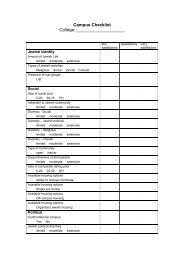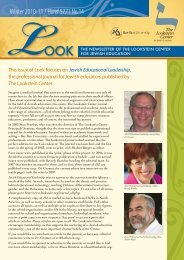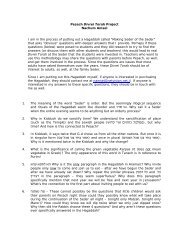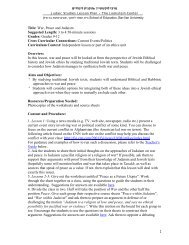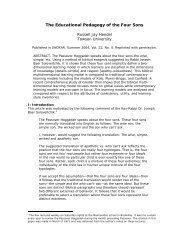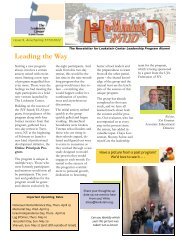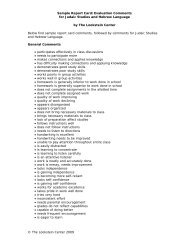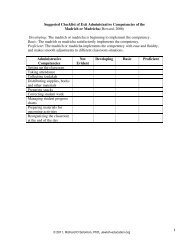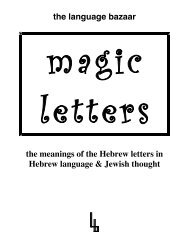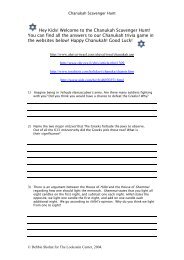FUNDAMENTAL CONCEPTS of the CLASSICAL HEBREW VERB
FUNDAMENTAL CONCEPTS of the CLASSICAL HEBREW VERB
FUNDAMENTAL CONCEPTS of the CLASSICAL HEBREW VERB
Create successful ePaper yourself
Turn your PDF publications into a flip-book with our unique Google optimized e-Paper software.
Chapter 11<br />
INFINITIVE AND GERUND<br />
Infinitive<br />
The infinitive (in any language) may be regarded as <strong>the</strong> name <strong>of</strong> <strong>the</strong> verb. It may or may not have o<strong>the</strong>r uses,<br />
which vary from one language to ano<strong>the</strong>r. In Hebrew <strong>the</strong> infinitive is also <strong>the</strong> best way <strong>of</strong> naming <strong>the</strong> verb for a<br />
very special reason: Hebrew verbs (nearly) all have three-letter roots, but in <strong>the</strong> course <strong>of</strong> inflexion some <strong>of</strong><br />
<strong>the</strong>se letters may drop out. Sometimes you are left with only one letter <strong>of</strong> <strong>the</strong> root (e.g. וַתֵּט Num. 22:23 from <strong>the</strong><br />
root .(נטה The kal (simple active) infinitive always* shows <strong>the</strong> three letters <strong>of</strong> <strong>the</strong> root clearly, and <strong>the</strong>refore<br />
should be used to name <strong>the</strong> verb. There is a modern tendency to use <strong>the</strong> gerund, or <strong>the</strong> perfective, and <strong>the</strong>se lead<br />
to confusion and problems. All you have to remember is that it is <strong>the</strong> name <strong>of</strong> <strong>the</strong> verb, and what <strong>the</strong> infinitive<br />
means is something else. It does not correspond in meaning or in use with <strong>the</strong> English infinitive.<br />
(* The only exception is with verbs where <strong>the</strong> middle letter is yod, which may appear in <strong>the</strong> infinitive as vav.<br />
It is <strong>the</strong>refore customary with verbs <strong>of</strong> <strong>the</strong> second conjugation, where <strong>the</strong> middle letter is ei<strong>the</strong>r vav or yod, to<br />
use <strong>the</strong> gerund instead. This clearly differentiates between vav and yod.<br />
) קוּם שִׂ י ם Gerund קוֹם שׂוֹם e.g. Infinitive<br />
The Hebrew infinitive is, as in most languages, invariable. There is no inflexion <strong>of</strong> it, it cannot take prefixes<br />
or suffixes or change its vowel. There is an infinitive for every stretch and voice that exists, i.e. up to seven for<br />
each verb. In addition, <strong>the</strong>re is a choice between two forms for <strong>the</strong> piel (<strong>the</strong> grammar books give <strong>the</strong> very rare<br />
form ,כַּתֹּב but we usually find ,(כַּתֵּב and <strong>the</strong>re are two different forms for <strong>the</strong> nifal, which are used on different<br />
occasions.<br />
What is <strong>the</strong> infinitive used for? It is NOT used instead <strong>of</strong> <strong>the</strong> gerund, as in English (as will be explained<br />
below) but has three special uses:<br />
1. It is used toge<strong>the</strong>r with an indicative (perfective or imperfective) for emphasis. This is met with at least in<br />
<strong>the</strong> Torah fairly <strong>of</strong>ten.<br />
.זָכֹר and שָׁ מֹר 2. It is on very rare occasions used instead <strong>of</strong> an imperative, particularly with <strong>the</strong> verbs<br />
These are important because <strong>of</strong> <strong>the</strong> Ten Commandments and o<strong>the</strong>r occurrences, but o<strong>the</strong>rwise <strong>the</strong> beginner can<br />
ignore this. (There is indeed doubt as to whe<strong>the</strong>r even on <strong>the</strong>se occasions <strong>the</strong> infinitive is used instead <strong>of</strong> an<br />
imperative, and it may simply be a shortened form <strong>of</strong> <strong>the</strong> ‘strong command’ use <strong>of</strong> <strong>the</strong> imperfective, which we<br />
(.זָכֹר תִּזְכֹּר is short for זָכֹר i.e. have not yet come to,<br />
3. It is on rare occasions used where we would use a participle, e.g. וְנָתוֹן אֹתוֹ (Gen. 41:43) ‘putting him’; and<br />
especially in <strong>the</strong> infinitive הָלֹךְ which is <strong>the</strong>n followed by ano<strong>the</strong>r infinitive,<br />
e.g.<br />
, etc.<br />
This idiomatic use is not easy to translate or even to understand, and is not for <strong>the</strong> beginner.<br />
הָלֹךְ וָשׁוֹב<br />
הָלֹךְ וְנָסֹעַ,<br />
הָלֹךְ וּבָכֹה<br />
To summarise, <strong>the</strong> main use <strong>of</strong> <strong>the</strong> infinitive in practice is for emphasis, and we use it to name <strong>the</strong> verb.<br />
Gerund<br />
The gerund is a verbal noun, and in some ways parallels <strong>the</strong> participle which is a verbal adjective. The<br />
gerund is a noun and behaves like one, yet it can take an object like a verb.<br />
The gerund encapsulates <strong>the</strong> concept <strong>of</strong> <strong>the</strong> verb. If <strong>the</strong> verb describes an action as taking place, <strong>the</strong> gerund<br />
abstracts <strong>the</strong> action as a concept (writing, destroying). Likewise if <strong>the</strong> verb describes a state <strong>of</strong> affairs (e.g. sit),<br />
<strong>the</strong> gerund abstracts and names that state <strong>of</strong> affairs (sitting). Where English uses <strong>the</strong> infinitive (instead <strong>of</strong> <strong>the</strong><br />
gerund), Hebrew does not use <strong>the</strong> infinitive, it uses <strong>the</strong> gerund.<br />
Here we come across a real difficulty in explaining a concept in English, not (as with ‘stretch’) because<br />
English lacks terminology and not (as with <strong>the</strong> conversive vav) because <strong>the</strong> concept is difficult, but because<br />
English has a peculiar problem <strong>of</strong> its own. In o<strong>the</strong>r languages, while <strong>the</strong> gerund may get confused with <strong>the</strong><br />
infinitive, it is quite distinct from <strong>the</strong> participle, but in English <strong>the</strong>y have <strong>the</strong> same form - both end in -ing. It is<br />
not easy for an English speaker to tell <strong>the</strong> difference.<br />
The best way, when you meet a word ending in -ing which is one <strong>of</strong> <strong>the</strong>se two, is to try a substitution. Try to<br />
substitute an infinitive - if it works, it is a gerund; for example ‘I like eating’ ‘I like to eat’.<br />
Try to substitute a noun - if it works it is a gerund; for example ‘I like eating’ ‘I like music’.



